N.B. COVID-19 roundup: New case discovered in the Saint John region
Dr. Jennifer Russell says the individual came into contact with someone with COVID-19 in Ontario
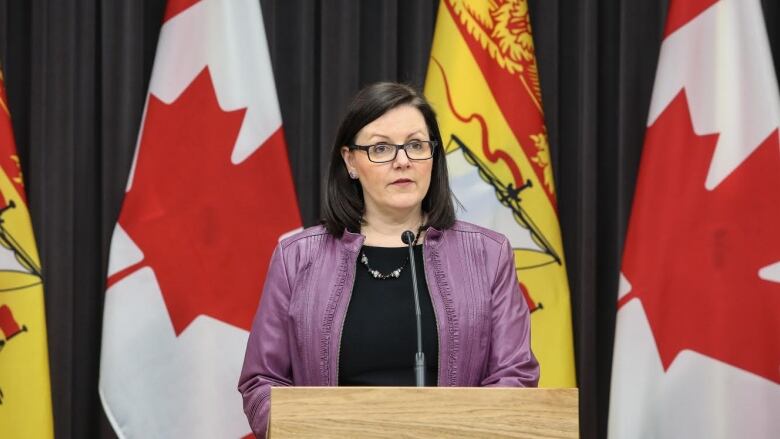
Latest
- 38 vehicles a day turned away at border
- Local businesses want province to let them reopen too
- Province to give out technology to help students learn at home
- Province to share virus update Wednesday
- Residents concerned over extra traffic in Shediac area
- New case of COVID-19 not surprising, epidemiologist says
- What to do if you have symptoms
New Brunswick's chief medical officer of health has announced one new case of COVID-19 in the province, bringing the total number of active casesto two.
The latest case is travel-related and involves apersonbetween the ages of 20 and 29 in Zone 2, which is the Saint John region, said Dr. Jennifer Russell.
The individual had come into contact with someone who later tested positive for COVID-19 in Ontario. Under the border-crossing rules, the New Brunswick resident had to immediately go into self-isolation on returning to the province and had no contact with other peoplebefore being tested.
Russell wouldn't say whether that individual drove or flew to New Brunswick.
Russell said a case that was announced Tuesday is still under investigation and it's not known yetif it's travel-related or a community transmission.
Russell also provided more information about a personwho landed at the Moncton airport last week who had tested positive for COVID-19.
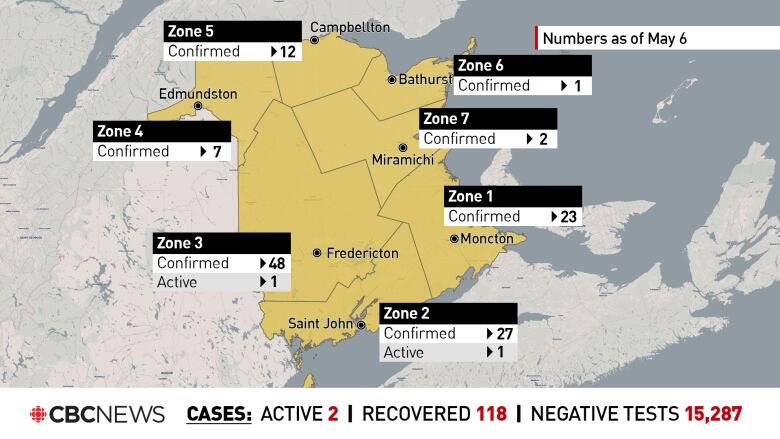
That individual was tested in Alberta, she said, and was no longer contagious on the WestJet flightto New Brunswick.
"They had finished their self-isolation after their diagnosis," she said.
For privacy reasons, Russell couldn'tsay how long that personwas in New Brunswick or where the person went on leaving the airport.
News of the case came from the airport originally. The Public Health Agency of Canada had informed WestJet, whichinformed the airport.On Monday, Public Healthseemed caught off guard by the announcement.
"What we're doing as an after action is to just go through the processes and communication issues around that just to make sure we're all clear and that doesn't happen again," Russellsaid Wednesday.
New Brunswick has had 120 confirmed cases of COVID-19, and 118 people have since recovered from the disease. The province had no confirmed active cases between Saturday and Tuesday.
Russell said people should expect there will be more cases and must stay vigilant as the province starts to reopen.
"It's about setting expectations," she told CBC News. "So if the public understands and is able to internalize the fact that we are going to be living with COVID-19 for 18 to 24 months until there's a vaccine, we're pretty much past mile one of a 26-mile marathon.
38 vehicles a day turned away at border
Premier Blaine Higgssays border controls, which were implemented at the end of March, will continue "until the foreseeable future."
This means, only essential travellers, such as commercial drivers, will be allowed into the provinceand non-essential travellers out will be kept out. People coming to work in New Brunswick must self-isolate for 14 days upon their arrival.
Higgs said he was also aware of workers from outside the provinceworking on a construction project inFredericton whodidn't self-isolate properly.
However, the problem has since been resolved, Higgs said, without providing details.
"To my knowledge that situation has been addressed directly to ensure they are following the rules.
Five people arriving in New Brunswick by airplane have been forced to turn around and go back where they came from, Higgs said.
And over the last 10days, an average of 38 vehicles a day are being turned away from the province's seven entry points. He didn't say how many are let through.
"We are vulnerable to the virus no matter what steps we take, but we must do everything we can to minimize the risk," Higgs said.
People travelling through the province on their way to another jurisdiction will be screened on arrival at a land border or airport and made aware of public health directives. Those who pass screening will be told to proceed directly to their destination.
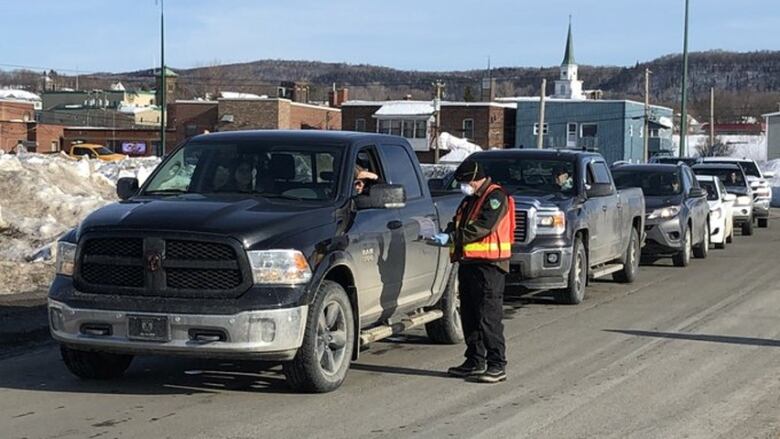
He said property owners in other provinces who wish to return to their second home in New Brunswick, won't be allowed back until Public Health reviews the risk.
"At this point intime it's too early to open the borders up," he said.
Higgs said he will be discussing border controls with the all-party COVID-19 committee and will make changes if needed.
Businesses urged to get ready to reopen soon
The province will announce this week when businesses can reopen.
"I have been encouraging business for weeks to prepare for the new normal and reopening," Premier BlaineHiggssaid Wednesday, almost two weeks after he announced the various phases of an economic recovery plan.
The next phase, which will allow manybusinesses to reopen with controls, was to start two to four weeks after the plan was revealed.
"We are days away and I am asking you again to plan and prepare," Higgs said. "Determine how you can operate within the public health guidelines of physical distancing, cleanliness and hand-washing."
With the exception of the two-household bubble rule, Dr. Jennifer Russell, New Brunswick's chief medical officer of health, said residentswill still be asked to stay six feet, or two metres, apart from others.
Higgs encouraged New Brunswickers who don't have jobs to return to visit the WorkingNB website.
"We understand the urgent need to fill positions in various sectors, including fisheries and agriculture," Higgs said.
He also encouraged employers to take part in the virtual career fair that's been offered May 12 and 13 on the website.
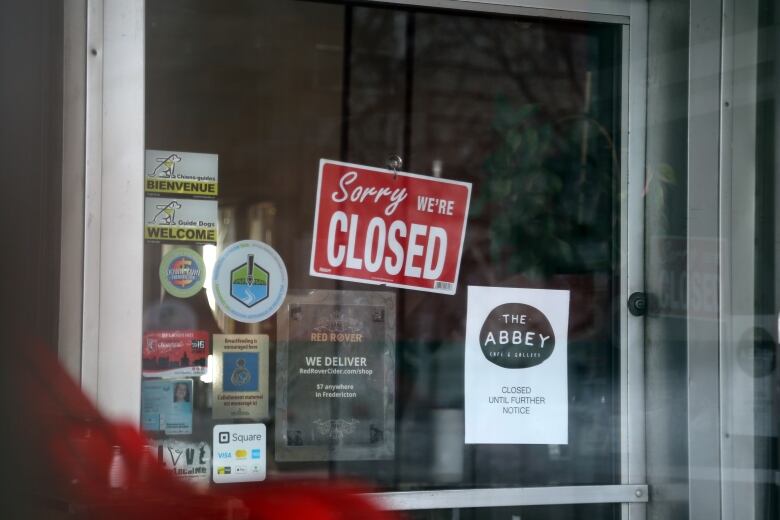
New Brunswick businesses have said they'reready to reopen they're just waiting for the province to give them the green light, the Retail Council of Canada says.
"If you are a retailer that's not doing things the right way, it won't be long before that message is out there on social media," saidJim Cormier, the Atlantic director for the Retail Council of Canada.
"It's not going to be good for your business in the long term. People won't be showing up to shop in your store if they don't feel safe and confident when they're in there."
The new rules could include everything fromPlexiglas booths for cashiers to moresignsin retail stores.
Cormiersaid some employees have expressed concerns about returning to work during a pandemic, even if New Brunswick has seen a relatively low number of cases.
These concerns havebeen countered with additional worriesover what impact a prolonged closure could do to some businesses.

Cormier said employees have rights when it comes to safe workplaces, and there are procedures in place to address unsafe conditions.
"That can all be dealt with through, you know, in this case speaking to WorkSafeNB," he said.
"They would send a person into the workplace to say 'OK, well the employee has a point here or no they don't and these are the changes that should be made to ensure that there is a safe workplace.'"
Scientific consensus is that a vaccine for COVID-19 would not be available until sometime next year at the earliest.
But Cormier said some new practices may continue even after COVID-19.
"I think you're going to see going forward the retail floor space will be changed forever and that there will be more spacing to ensure people can be physically distant," said Cormier.
"You know the Plexiglas barriers at the cash, those might end up becoming the new norm."
Province to give out technology to help students learn at home
The New Brunswick government will soon be handing out internet-ready devices to hundreds of families to help them adapt to online learning made necessary by COVID-19.
The province has bought and will distribute 1,000 iPad tablets with data plans, 500 laptop computers and 300 mobile internet hubs so that children can get access to materials posted online.
The total cost is $860,000,which comes from the Department of Education's existing budget. Money saved on costs, such as gas for school buses, was redirected to the devices, Education Minister Dominic Cardy said.
Residents concerned about extra traffic in Shediac area
Plenty of New Brunswickers were out and about in the warm weather last weekend, causingan uptick in traffic in the Shediac area.
As part oflooseningrestrictions last month,the province reopened parks and beaches, including Parlee Beach.
However, the province did notreopen the main road heading into the park, Parlee Beach Road, which connects the beach directly with the twined Route 15.
This led to travellers to take smaller streets in residential areas to get to the beach, which turned into a headache for residents.
"We were bumper-to-bumper traffic," said Fred Durette ofPointe-du-Chne.
"Nobody could get into Shediac to get their groceries or get their drugs because everybody was coming from Moncton and wherever to go for a little drive."
Durette said the traffic woes were multiplied because people were also trying to go to the Pointe-du-Chne wharf, which is still closed.
Durette said residents of the community are upset and feel if the province wanted to reopen the park, it should have also reopened the road.
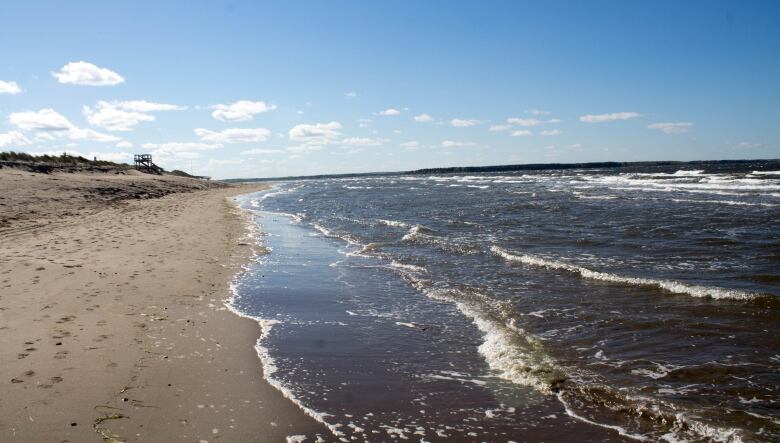
"People love to come here and we love having people here, but right now this little communitywhich borders the park and the beach, and borders the road to the wharf, with a road in the middle is suffering when we're stifled like that with people."
Durette said he was also concerned about possible COVID-19 spread, as he witnessed many people not observing physical distancing rules.
"We watch groups of students go to the beach arm-in-arm with beer in their hand, hauling their coolers," said Durette.
"There are no social distancing at all."
New case of COVID-19 not surprising, epidemiologist says
Colin Furness, an epidemiologist based in Toronto, said New Brunswickers shouldn't be too concerned about a new case popping up, especially after more than two weeks with no new cases.
He said a pattern of new cases would be more concerning.
"It would have been surprising if you'd hit absolute flat zero and never come off it. Some people may be sick mildly for a while before they seek help. So this is not concerning at all."
He said the rest of the country will be looking at New Brunswick to see what a new normal might look like following the pandemic.
This could include keeping store hours shorter, relying on takeout instead of dining in, and continued restrictions on travel.

He also expects to see changes in the design ofcubical-based office spaces and closed quarters of factory lines.
One thing he's also hoping will changeis the traditional handshake greeting.
"Handshaking is a really deep seated human behaviour," he said. "It's also a really risky behaviour as we now know."
The province's ability to reopen will be based on how effectively it can restrict New Brunswick's border crossings.Furness even suggested only allowing people to come into the province who have been tested
"I think you could open up wide right away, because you don't have community spread."
What to do if you have symptoms
People concerned they might haveCOVID-19 cantake a self-assessmenton the government website. People with two of those symptoms are asked to:
-
Stay at home.
-
Immediately call Tele-Care 811 or their doctor
-
Describe symptoms and travel history.
-
Follow instructions.
With files from Jordan Gill














_(720p).jpg)


 OFFICIAL HD MUSIC VIDEO.jpg)
.jpg)



























































































